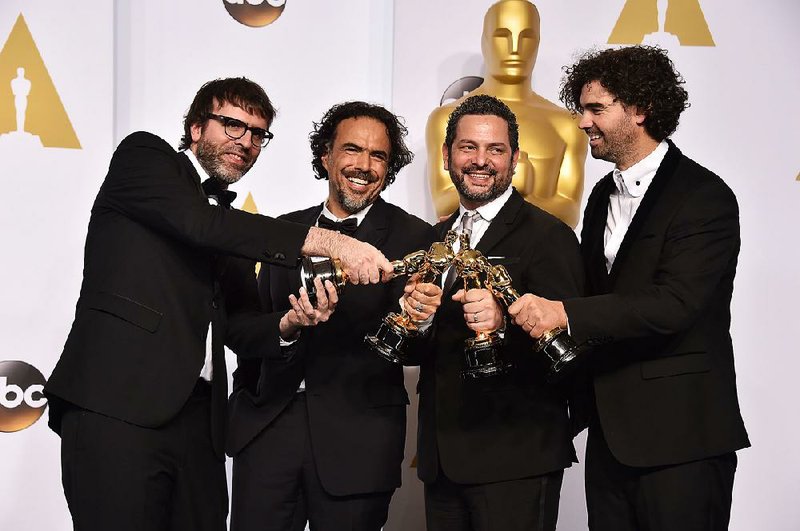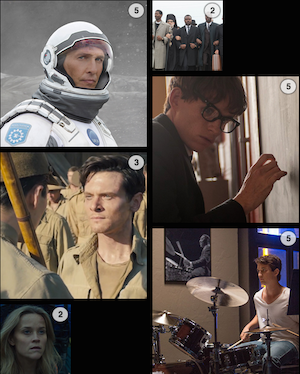LOS ANGELES -- For the third time in four years, Hollywood's top honor went to a story mostly about itself: Birdman won best picture at the 87th Academy Awards on Sunday night.
Despite relatively meager domestic ticket sales of $37.8 million, Birdman had been the favorite to win best picture, having swept the top prize at banquet after banquet leading up to the Oscars.
Minutes before, Alejandro Inarritu had won best director for Birdman, which also collected Oscars for best original screenplay and the cinematography of Emmanuel Lubezki. "Tonight I am wearing the real Michael Keaton tighty whities," Inarritu said, a joke about the long Broadway walk Keaton, the star, takes in his skivvies during the film.
Birdman, about a washed-up actor's comeback bid, followed two other Hollywood-related winners: The Artist, which won in 2012, was the bittersweet story of a silent film actor seemingly left behind by Hollywood's transition to sound. The next year, Argo won with its reality-based tale of a hostage rescue that used a fake film for cover.
Still, no one film achieved critical mass in a year that saw all eight of the best-picture nominees leave with at least one Oscar.
As expected, Julianne Moore won best actress for her faltering college professor with early-onset Alzheimer's disease in Still Alice, and Eddie Redmayne won best actor for his portrayal of Stephen Hawking in The Theory of Everything.
One of the year's smallest films, Whiplash, with just $11.3 million in ticket sales, became one of the night's biggest winners, stealing the editing award from presumably stronger competitors like Boyhood and American Sniper. A dramatic thriller set in a music school, Whiplash also collected prizes in the supporting actor and sound-mixing categories.
In Whiplash, J.K. Simmons won as expected for his role as an abusive music teacher. Deep into the telecast's second hour, Patricia Arquette took the supporting-actress prize for her portrayal of a single mother in Boyhood.
Arquette put in plugs for causes that ranged from "ecological sanitation in the developing world" to every woman who had "ever given birth" to every taxpayer in the country. Finally, her plea for equal rights for "women in the United States of America" got a big ovation.
The Grand Budapest Hotel, a whimsical period caper, won four Oscars, with support coming in the crafts categories. It lost the original-screenplay race, however, to the four writers behind Birdman, who included Inarritu. Best adapted screenplay went to Graham Moore for The Imitation Game, keeping that film -- nominated in eight categories -- from being shut out.
"When I was 16 years old, I tried to kill myself because I felt weird and I felt different and I felt like I didn't belong," Moore said. Noting that he had just collected an Oscar, Moore delivered a message to any teenagers out there feeling similar thoughts: "Stay weird."
Citizenfour, focused on Edward Snowden's leak of National Security Agency documents, took best documentary. (The telecast's host, Neil Patrick Harris, cracked that Snowden could not attend the ceremony "for some treason.")
John Legend and rapper Common got a standing ovation after performing their original song "Glory," which was featured in Selma. Minutes later, they collected Oscars in the category. The prize for original score went to Alexandre Desplat, an eight-time nominee and first-time winner for his Grand Budapest Hotel music.
The show revealed the efforts of the Academy of Motion Picture Arts and Sciences to quiet renewed clamor -- fueled by the perceived snub of Selma in the directing and acting categories -- over a lack of diversity among voters. Harris hit the controversy head on at the start of the show, quipping "tonight we honor Hollywood's best and whitest -- sorry -- brightest."
A Section on 02/24/2015


